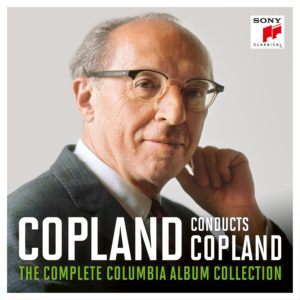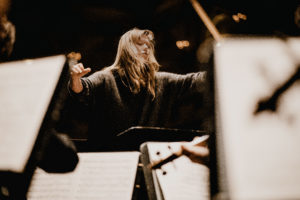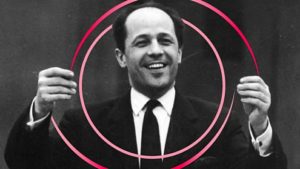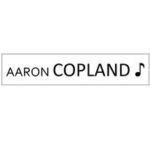
There are some Copland pieces that tend to take a lot longer for me to get to know, to appreciate and to love.
I think this is down to a number of reasons. Prior to a first listen, I might have been expecting one thing and the piece was quite different, so my first impression was one of slight disappointment. My first hearing might have been of a recording that doesn’t do the work justice or didn’t speak to me. Then some programmatic pieces almost certainly would fare better if I had seen as well as heard them the first time out in order to appreciate them better. And then there are works that just need lots of listens.
For me, there also seems to be another common thread that is shared by some of the works that I find a little bit more difficult: Lincoln Portrait, In the beginning, Canticle of Freedom, Vitebsk – Study on a Jewish theme and even Danzon Cubano and Outdoor Overture all have very short motifs that are introduced in the first few bars of the works. Several of these are just two or three notes but are very distinct. This is great if you like them but a bit off putting if you don’t.
I have always found the use of the Duh-Duh in Lincoln Portrait, Canticle and Vitebsk to be quite jarring. Similarly, the phrase “And God said” which is used throughout In the Beginning gives the work a very straight edged, sharp feel. Copland biographer Howard Pollack describes the work as an “acknowledged masterpiece of the choral repertory” but also refers to its “blocklike character” and “impenetrable, monolithic quality”!
In Lincoln Portrait which Copland composed five years before In the beginning he utilises a similar framework returning to the phrases “That is what he said. That is what Abraham Lincoln said” throughout.
With these pieces, it seems to me that my ears sonically focus on the motifs and repeated phrases, often to the detriment of the rest of the work. I guess it’s only natural that if you’re slightly perturbed by the beginning of a piece of music you are less likely to continue listening, give it lots of listens, explore different versions or venture to see it performed in concert.
So, it was a great opportunity for me to revisit these two works over the last week by watching two recent online performances.
Lincoln Portrait was performed by the Manhattan School of Music with narration by Jarvis Green and conducted by George Manahan. The concert took place on 17 September and was a part of a programme including Leonard Bernstein’s Symphonic Suite from On the Waterfront, Claude Debussy’s Ibéria from Images pour orchestre, and Ottorino Respighi’s Roman Festivals. It can be viewed here.
Copland really enjoyed hearing his music played by different standards of musicians. Many of his pieces were actually written for “use” and to be played by high school orchestras or developing players. He would have therefore been familiar to hearing variable performances or experiencing renditions where certain players perhaps weren’t quite up to scratch. Prior to watching the livestream, I didn’t know anything about MSM NYC and therefore had no pre-conceived notions, but I think it’s safe to say that I wasn’t expecting the rendition to be super polished.
The 100 strong orchestra were crammed onto the stage at the Neidorff Karpatti Hall and were a class act from the start. OK the first few bars of the Bernstein were a little awkward some of the solos wavered slightly but as soon as it got going it was a super charged and emotive performance full of great playing.
I have to say that I was somewhat distracted by the face masks -this was the first time I had seen wind and brass players playing through masks! There was lots of variation too – some had cut out a messy hole, some had a tiny hole, some had zips, some had Joker like smiles cut into them and the flautists had strange nosebags! It was unintentionally funny. However, this aside the music making was really something. I have listened to it again since without watching and the sound quality and performance in large parts, especially the ensemble playing could easily surpass some of my CD versions of the Bernstein and Copland.
On paper Lincoln Portrait should be a favourite piece – composed in Copland’s popular style with a heroic text. However, for me, this Copland work has always been overshadowed by the similar but infinitely better New Morning for the World by Joseph Schwantner which sets the words of Martin Luther King. The latter is more like Bernstein’s On the Waterfront going from violent brass and percussion to passages of great pathos. Having heard the Schwantner first, I was anticipating something equally appealing from my favourite composer but the, what seemed to me to be contrived narration coupled with the rather too jaunty middle section simply didn’t do it for me and it was a real disappointment.
However, over the years I have returned to this piece and tried to listen to it with fresh ears. This performance really helped my gradual re-evaluation. The narration by Jarvis Green found the correct middle ground of being staunch, stiff upper lipped whilst also managing to be very moving. Some of Lincoln’s words still resonate as clearly today as they did way back in the mid-19th century. The first part of the address in particular made me think of the current climate emergency and just how urgently we need strong world leadership at the forthcoming COP26 conference in Glasgow.
Fellow citizens, we cannot escape history. We of this congress and this administration will be remembered in spite of ourselves. No personal significance or insignificance can spare one or another of us. The fiery trial through which we pass will light us down in honor or dishonor to the latest generation. We, even we here, hold the power and bear the responsibility.”
Despite being delivered through a face mask (which can’t have been easy) it was perfectly enunciated. You can read the text from Lincoln Portrait here.
The second half of the concert was just as good with the young orchestra showing great concentration and stamina in delivering nearly 90 minutes of very impressive music.
What a discovery! And better still I have since found out that the MSM has a full catalogue of performances this season that will all be available FREE to watch on their website. Next week (October 5) the MSM Wind Ensemble will be performing An Outdoor Overture and I am really looking forward to the MSM Philharmonia doing Alberto Ginastera’s Four Dances from Estancia on October 21.
Over the Atlantic at the National Concert Hall Dublin on the 26 September there was not an instrument or indeed face mask in sight for the Music from The Four Corners of The Earth concert performed by Ireland’s premier choral group, the Chamber Choir Ireland conducted by Paul Hillier. Copland’s choral piece In the Beginning kicked off proceedings and was followed Australian Ross Edwards’ Mountain Chant, Russian Dmitry Bortniansky’s Concerto No. 24 (I will lift mine eyes to the mountain) and Brazilian Heitor Villa Lobos’ Bachianas Brasileiras (No.9).
My first experience of In the Beginning was on the Bernstein Century disc alongside The Second Hurricane. As with Lincoln Portrait, I remember this being a profound disappointment and I virtually filed the work (and the CD) away under the label “not my thing”. On one occasion back in the early 00s (when I went to pretty much any Copland concert) the work was being performed in Bristol and I chose not to go.
In more recent times as I gradually realised less accessible works were worth the effort, I have revisited this piece. Indeed, I do see a resemblance to some of Copland’s modernist and serial works in as much that the first few times you listen you simply have to get through it and try and find something in the granite to cling on to. Yet with more listens, it really does feel like flower buds opening to reveal a beauty that was previously invisible.
Copland set the first chapter and a half of the book of Genesis from the King James version of the Bible in this challenging 16 minute work – “a whopping 38 verses” as Howard Pollack describes.
The work uses a mezzo-soprano soloist (in this case Laura Lamph) as the narrator and mixed chorus acapella. My highlights include the lovely “herb yielding seed and fruit tree yielding fruit” section on the third day, the veritable supernova “Lights of the Firmament” section on the fourth day particularly when the male bass voices join in, the lyrical “dominion over fish of the sea and over the fowl” of the sixth day and the wonderful ethereal end where man becomes a “living soul”.
I thought the performance was excellent and I obviously enjoyed it so much that some of the sections became ear worms that kept going through my head throughout my night’s sleep! On that basis I really think the work has now firmly bedded in my psyche!
If you are interested in exploring this work further, there are three other online versions on the official Aaron Copland website. You can read the Genesis verses as they are set here.
Of the other works I did very much like the Bortniansky and found the Edwards work very interesting as the most modern of the pieces. Unfortunately, Villa Lobos has always had the effect on me that his music did on Copland:
As I see it, the Villa-Lobos music has one outstanding quality – it’s abundance”
I love Latin American classical music but I have never heard a piece by Villa Lobos that I loved or indeed was desperate to hear again. (Perhaps I need more listens?). This Bach transcription with no text but sung notes was the least successful of the works performed on the night. Even though like virtually everyone, I love Bach and think he was probably the biggest of all the musical geniuses, it doesn’t mean that his music can take any transcription. For me, this was too much like the Swingle Singers. Also, heretical as it may sound I sometimes think that his music is slightly over played- my Bach barometer at least seems off the scale!
Although I can see the sense for In the Beginning kicking off the concert, I would have switched this with the Villa Lobos. That would have saved the best until last and made an enjoyable concert even more memorable.
One final word on both concerts – the production values and sound recording for both were superb. I can’t get to all the concerts I would like to so being able to tune in to performances of this standard whilst reducing my carbon footprint is a real pleasure. Other musical groups and venues should take note. Well done to all concerned and please keep ’em coming!









Leave a Comment